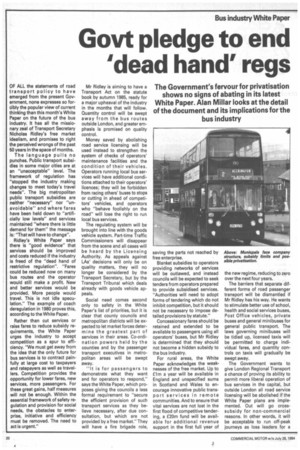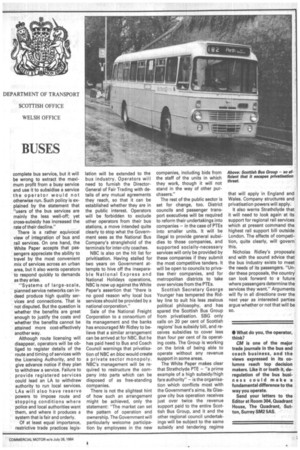Govt pledge to end 'dead hand' regs
Page 22

Page 23

If you've noticed an error in this article please click here to report it so we can fix it.
OF ALL the statements of road transport policy to have emerged from the present Government, none expresses so forcibly the popular view of current thinking than this month's White Paper on the future of the bus industry. It has all the missionary zeal of Transport Secretary Nicholas Ridley's free market idealism, and promises to right the perceived wrongs of the past 50 years in the space of months.
The language pulls no punches. Public transport subsidies in some major cities are at an "unacceptable" level. The framework of regulation has "stopped the industry making changes to meet today's travel needs". The big metropolitan public transport subsidies are neither "necessary" nor "unavoidable" and where fares have been held down to "artificially low levels" and services maintained "where there is little demand for them" the message is: "That will have to change".
Ridley's White Paper says there is "good evidence" that services should be improved and costs reduced if the industry is freed of the "dead hand of restrictive regulation". "Fares could be reduced now on many bus routes and the operator would still make a profit. New and better services would be provided. More people would travel. This is not idle speculation." The example of coach deregulation in 1980 proves this, according to the White Paper.
Rather than cut services or raise fares to reduce subsidy requirements, the White Paper urges the industry to accept competition as a spur to efficiency. -We must get away from the idea that the only future for bus services is to contract painfully at large cost to taxpayers and ratepayers as well as travellers. Competition provides the opportunity for lower fares, new services, more passengers. For these great gains, half measures will not be enough. Within the essential framework of safety regulation and provision for social needs, the obstacles to enterprise, initiative and efficiency must be removed. The need to act is urgent."
Mr Ridley is aiming to have a Transport Act on the statute book by autumn 1985, ready for a major upheaval of the industry in the months that will follow. Quantity control will be swept away from the bus routes outside London, and greater emphasis is promised on quality control.
Money saved by abolishing road service licensing will be used instead to strengthen the system of checks of operators' maintenance facilities and the condition of their vehicles. Operators running local bus services will have additional conditions attached to their operators' licences; they will be forbidden from racing others' buses to stops or cutting in ahead of competitors' vehicles, and operators who "behave foolishly on the road" will lose the right to run local bus services.
The regulating system will be brought into line with the goods vehicle system. Part-time Traffic Commissioners will disappear from the scene and all cases will be heard by the Licensing Authority. As appeals against LAs' decisions will only be on quality matters, they will no longer be considered by the Transport Secretary, but by the Transport Tribunal which deals already with goods vehicle appeals.
Social need comes second only to safety in the White Paper's list of priorities, but it is clear that county councils and metropolitan districts will be expected to let market forces determine the greatest part of services in their areas. Co-ordinationpowers held by the counties and by the passenger transport executives in metropolitan areas will be swept away.
"It is for passengers to demonstrate what they want and for operators to respond," says the White Paper, which proposes giving the councils a less formal requirement to "secure the efficient provision of such transport services as they believe necessary, after due consultation, but which are not provided by a free market." They will have a fire brigade role, saving the parts not reached by free enterprise.
Blanket subsidies to operators providing networks of services will be outlawed, and instead councils will be expected to seek tenders from operators prepared to provide subsidised services. "Authorities will need to adopt forms of tendering which do not inhibit competition, but it should not be necessary to impose detailed provisions by statute."
Concessionary fares should be retained and extended to be available to passengers using all operators' buses, but Mr Ridley is determined that they should not become a hidden subsidy to the bus industry.
For rural areas, the White Paper acknowledges the weaknesses of the free market. Up to Om a year will be available in England and unspecified sums in Scotland and Wales to encourage innovative public transport services in remote communities. And to ensure that vital services are not lost in the first flood of competitive tendering, a E20m fund will be available for additional revenue support in the first full year of the new regime, reducing to zero over the next four years.
The barriers that separate different forms of road passenger transport will be dismantled if Mr Ridley has his way. He wants to stimulate better use of school, health and social services buses, Post Office vehicles, private buses and general minibuses for general public transport. The laws governing minibuses will be tidied up, licensed taxis will be permitted to charge individual fares, and quantity controls on taxis will gradually be swept away.
The Government wants to give London Regional Transport a chance of proving its ability to permit more liberal operation of bus services in the capital, but outside London all road service licensing will be abolished if the White Paper plans are implemented. Out will go crosssubsidy for non-commercial reasons. In other words, it will be acceptable to run off-peak journeys as loss leaders for a complete bus service, but it will be wrong to extract the maximum profit from a busy service and use it to subsidise a service the operator would not otherwise run. Such policy is explained by the statement that "users of the bus services are mainly the less well-off; yet cross-subsidy has increased the rate of their decline."
There is a rather equivocal view of integration of bus and rail services. On one hand, the White Paper accepts that passengers appreciate the ability to travel by the most convenient mix of services across an urban area, but it also wants operators to respond quickly to demands as they arise.
"Systems of large-scale, pianned service networks can indeed produce high quality services and connections. That is not disputed. But the question is whether the benefits are great enough to justify the costs and whether the benefits cannot be attained more cost-effectively another way.
Although route licensing will disappear, operators will be obliged to register details of the route and timing of services with the Licensing Authority, and to give advance notice if they plan to withdraw a service. Failure to provide registered services could lead an LA to withdraw authority to run local services. LAs will also have reserve powers to impose route and stopping conditions where police and local authorities want them, and where it produces a system that is fair and orderly.
Of at least equal importance, restrictive trade practices legis
lation will be extended to the bus industry. Operators will need to furnish the DirectorGeneral of Fair Trading with details of any mutual agreements they reach, so that it can be established whether they are in the public interest. Operators will be forbidden to exclude other operators from their bus stations, a move intended quite clearly to stop what the Government sees as the National Bus Company's stranglehold of the terminals for inter-city coaches.
NBC is also on the hit list for privitisation. Having stalled for two years on Government attempts to hive off the inseparable National Express and National Holidays operations, NBC is now up against the White Paper's assertion that "there is no good reason why local bus services should be provided by a national corporation."
Sale of the National Freight Corporation to a consortium of its management and the banks has encouraged Mr Ridley to believe that a similar arrangement can be arrived at for NBC. But he has paid heed to Bus and Coach Council warnings that privatisation of NBC en bloc would create a private sector monopoly. NBC's management will be required to restructure the company into parts which can be disposed of as free-standing companies.
There is not the slightest hint of how such an arrangement might be achieved, only the statement: "The market can set the pattern of operation and ownership. The Government will particularly welcome participation by employees in the new companies, including bids from the staff of the units in which they work, though it will not stand in the way of other purchasers."
The rest of the public sector is set for change, too. District councils and passenger transport executives will be required to reform their undertakings into companies — in the case of PTEs into smaller units. It will be illegal to provide general subsidies to those companies, and supported socially-necessary services will only be provided by these companies if they submit the most competitive tenders. It will be open to councils to privatise their companies, and for metropolitan districts to take over services from the PTEs.
Scottish Secretary George Younger has tempered the Ridley line to suit his less zealous political philosophy, and has spared the Scottish Bus Group from privatisation. SBG only calls on 20 per cent of Scottish regions' bus subsidy bill, and receives subsidies to cover less than four per cent of its operating costs. The Group is working on the brink of being able to operate without any revenue support in some areas.
The White Paper makes clear that Strathclyde PTE — "a prime example of a high subsidy/high fare authority" — is the organisation which conflicts most with the Government's aims. Its Glasgow city bus operation receives just over twice the revenue support paid to the entire Scottish Bus Group, and it and the other regional council undertakings will be subject to the same subsidy and tendering regime that will apply in England and Wales. Company structures and privatisation powers will apply.
It also warns Strathclyde that it will need to look again at its support for regional rail services which at present command the highest rail support bill outside London. The effects of competition, quite clearly, will govern this.
Nicholas Ridley's proposals end with the sound advice that the bus industry exists to meet the needs of its passengers. "Under these proposals, the country can look forward to a future where passengers determine the services they want." Arguments will fly in all directions over the next year as interested parties argue whether or not that will be
SO.




























































































